Commentary on Poem:
"Inspired by Ripple"
Golden words glowed as sunshine
tunes flowed on the harp—
voice came with music

Golden Words
|
.jpg)
Sunshine Glow
|
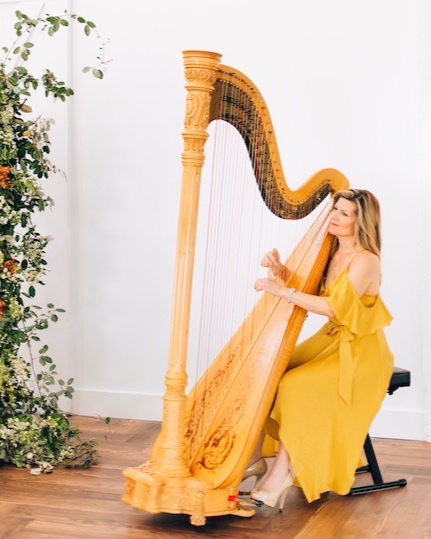
Copley Playing Harp
|
The first stanza of the Grateful Dead's
lyrics to "Ripple"—
If my words did glow with the gold of sunshine
And my tunes were played on the harp unstrung
Would you hear my voice come through the music
Would you hold it near as it were your own?
Borrowed words from above to create my first stanza
of 17-syllables haiku. "Voice came with music"
segued to the 2nd stanza
of Beethoven 9th Symphony introducing
the human voice in a symphony.
|
"Ode to Joy" hand-me down
from Schiller to Beethoven
filling the air.
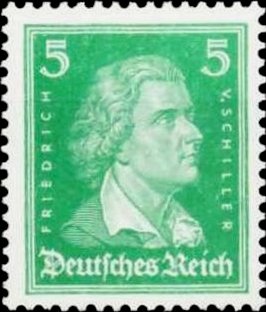
Germany 353b: Schiller
(issued August 1927) |
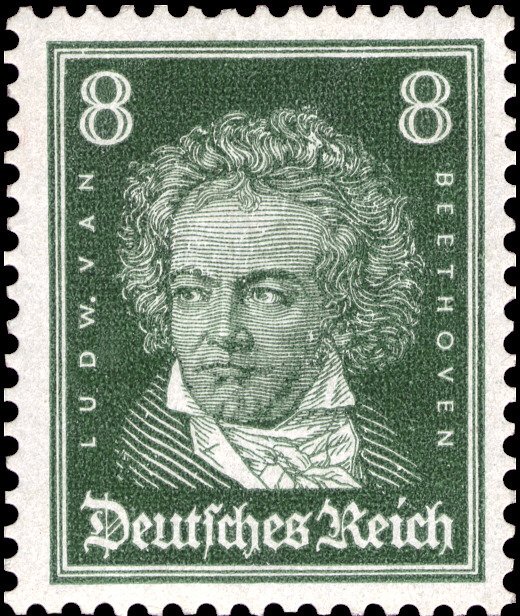
Germany 354: Beethoven
(issued August 1927) |

Schiller's "Ode to Joy"
Beethoven's Symphony #9 |
The Grateful Dead's lyrics in the 2nd stanza:
"It's a hand-me-down... songs to fill the air" made me realize
that Beethoven's "Ode to Joy" chorus in his
Ninth Symphony (1824)
was a "hand-me-down" from Schiller's poem
"Ode to Joy" (1785).
Surprised to find Germany issued postage stamps honoring Schiller (Germany 353b, 5 pf)
and Beethoven (Germany 354, 8 pf) right next to each other (August 1927).
Combined Beethoven' music score and Schiller's Ode "O you millions,
I embrace you. Here's a joyful kiss for all." in graphic design image of nine doves flying out
of Beethoven's head to symbolize inspiration from a literary and a musical genius.
Photo Sources: Germany 353b Schiller
(colnect.com);
Germany 354 Beethoven (colnect.com);
"Ode to Joy" (wisdomportal.com)
|
No wind or tossed pebble
to make ripple— it must
be from angel's wings.

Ripple in Lake
|

Angel's Wings
|

Ireland C2: Angel (issued 4-7-1948)
|
| The 3rd stanza of "Ripple" is a 17-syllable haiku:
"Ripple in still water / When there is no pebble tossed / No wind to blow".
These lines are like a Zen koan. A tossed pebble or blown wind
will create ripples. After some meditation, realized that it
is coming from an invisible realm— ripple from angel's wings. |
Photo Source: Ripple in Lake
(financialservicesperspectives.com);
Angel's Wings (art.com);
Ireland C2 (colnect.com)
|
May your cup be full
of beauty and wonder
filled with bountiful days.
.jpg)
Cup of Beauty & Wonder
|

Full Cup
|

Bountiful Days
|
|
First half of 4th stanza in the Grateful Dead's
lyrics to "Ripple"—
Reach out your hand if your cup be empty
If your cup is full may it be again
inspired the blessing of your cup be full
not of coffee, tea, or juice,
but on a grander scale
"full of beauty and wonder filled with bountiful days."
Photo Sources: Cup of Beauty & Wonder
(teepublic.com);
Full Cup (medium.com);
Bountiful Days (pinterest.com)
|
There is a fountain
flowing from lower to
upper waters in you—
.jpg)
Nature's Fountain (Butchart Gardens)
|
.jpg)
Chakras of Yogi
|
Second half of 4th stanza in the Grateful Dead's
lyrics to "Ripple"—
Let it be known there is a fountain
That was not made by the hands of men
Grateful Dead's lyricist Robert Hunter
was asked what is his favorite lyric.
He said it's from
"Ripple"— "favorite line I ever wrote, that's ever popped
into my head. And I believe it, you know?"
Since this fountain was not made by men,
it must be from Nature
or a divine origin.
Genesis I:6-8
tells about the 2nd Day of Creation—
6 And God said, Let there be a firmament in the midst of the waters,
and let it divide the waters from the waters.
7 And God made the firmament, and divided the waters which were under
the firmament from the waters which were above the firmament: and it was so.
8 And God called the firmament Heaven.
And the evening and the morning were the second day.
I've wondered often about the "upper" and "lower" waters,
until reading about
kundalini yoga
of raising the chakras to enlightenment.
Tle "lower waters" are
sexual fluids which must be transformed to the "upper water"
cerebral fluids
or crown chakra
(heavenly firmament of illumination).
Photo Sources: Nature's Fountain
(wikimedia.org);
Chakras of Yogi (ambujayoga.com/)
|
taste celestial delight
in Solomon's Garden
from the "Song of Songs".
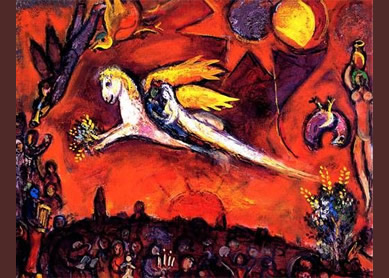
Celestial Delight: Chagall's Song of Songs, Ch. 4
|
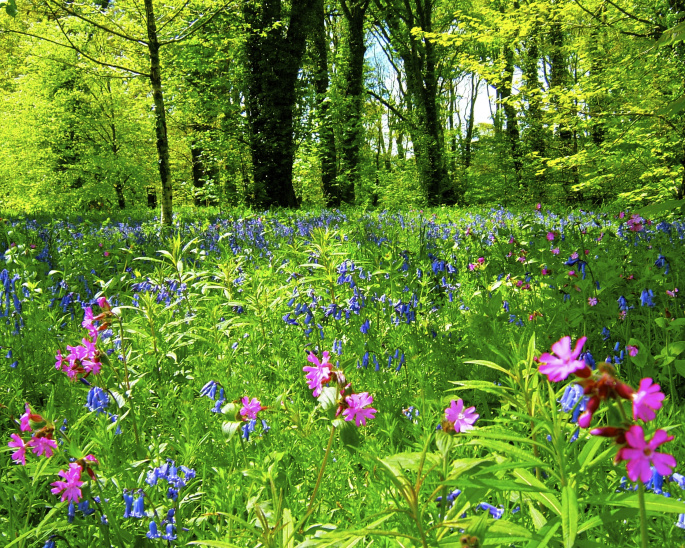
Solomon's Garden
|
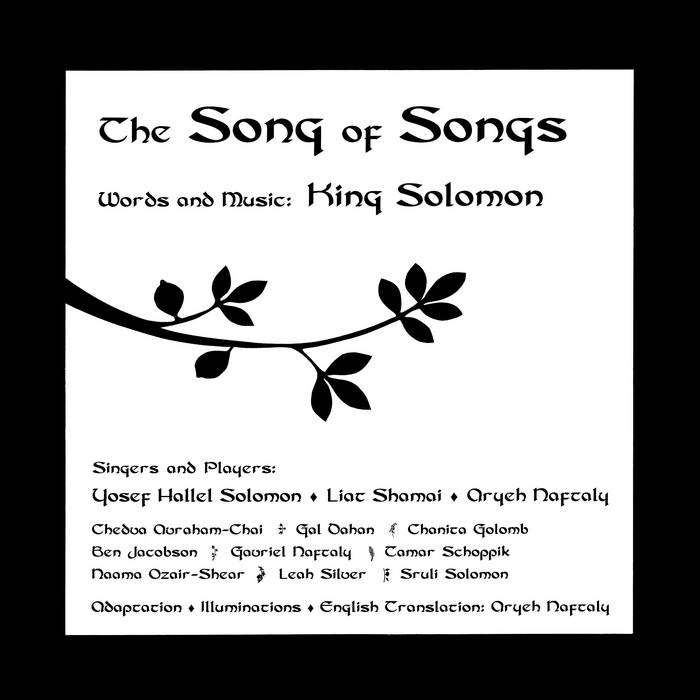
Solomon's "Song of Songs"
|
Once the "upper waters" crown chakra is experienced
through contemplation, we taste celestial delight.
Marc Chagall's "Song of Songs" painting shows a loving couple
on the winged horse Pegasus swept
upward to the heavenly firmament. Quoting from Chapter 4:15-16 from
Song of Songs
(1014 BC):
15. [Thou art] a fountain of gardens, A well of living waters,
And flowing streams from Lebanon.
16 Awake, O north wind; And come, thou south; Blow upon my garden,
that the spices thereof may flow out. Let my beloved come into
his garden, And eat his precious fruits.
Photo Sources: Celestial deght: Chagall's "Song of Songs", Chapter 4
(bibleodyssey.org);
Solomon's Gardens (kathrynwarmstrong.wordpress.com);
"Song of Songs" (theelevators1.bandcamp.com)
|
From dawn to dusk the road
is clear— walk straight ahead
with wind at your back.
.jpg)
Dawn
|
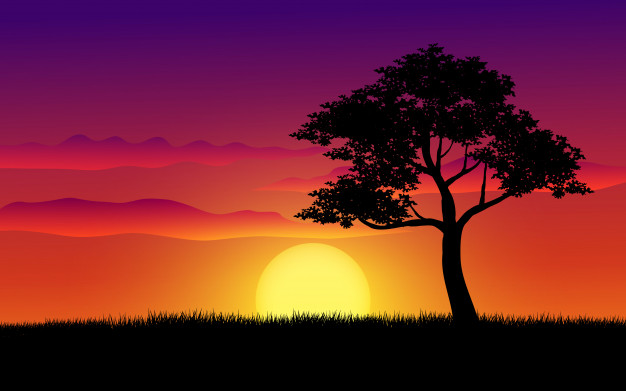
Dusk
|
.jpg)
Shikoku Pilgrimage
|
The 5th stanza in the Grateful Dead's
lyrics to "Ripple"—
There is a road, no simple highway
Between the dawn and the dark of night
And if you go no one may follow
That path is for your steps alone
David Dodd's analysis of this stanza: "The path between dawn (birth) and dark (death)
is a metaphor for life,
each life being individual.
Linda Gershon's analysis:
"Dark represents despair, bleakness, unhappiness, confusion, cluelessness,
while the dawn means contentment, clarity, revelation, light, optimism.
What's between them is
arduous, difficult to navigate and must be discovered on one's own."
Walt Whitman, "Song of Myself" (1892)
Section 46, Lines 10-11:
"Not I, not any one else can travel that road for you,
You must travel it for yourself."
In Isaiah 42:16, God tells Cyrus (712 BC):
"And I will bring the blind by a way that they knew not;
I will lead
them in paths that they have not known:
I will make darkness light before them, and crooked things straight."
"Guru" is a Sanskrit word with meaning "gu" (darkness)
and "ru" (light). So a guru is a spiritual mentor or
guide who brings students from darkness to light, or ignorance
to knowledge (ego to cosmic consciousness).
Since God said in Isaiah 42:16: "I will make darkness light...
and crooked things straight",
I've made my road
clear, and walk in straight rather than crooked ways.
Mark 1:3:
"Prepare ye the way of the Lord, make his paths
straight." I realize the Grateful Dead's "simple highway"
may be straight and their road may be more convoluted.
However, I'm referring to spiritual pilgrimages like those
in Shikoku, Japan (750 miles)
and Camino de Santiago,
France to Spain (500 miles). These journeys may twist and turn
on the physical terrain of rivers and hills, but the
mind of
the pilgrim is straight and focused on self-purification.
Paul Brunton's The
Secret Path (1935) cautions
students on the spiritual path may find
themselves alone without followers, but
humbleness brings enlightenment.
Photo Sources: Dawn (pinterest.com);
Dusk (freepik.com);
Shikoku Pilgrimage (amenohitravels.com)
|
Follow Navaho's blessing—
walk with beauty above
and below you.
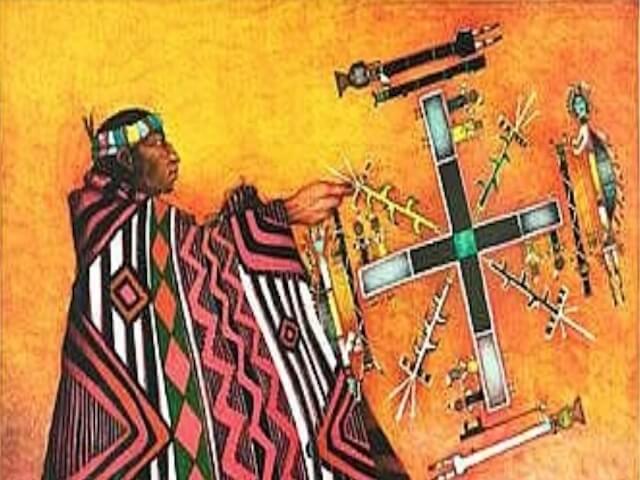
Navaho Costume & Cross
|
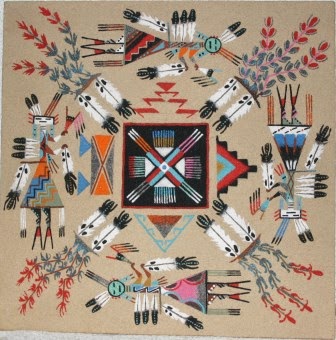
Navaho Sand Painting
|
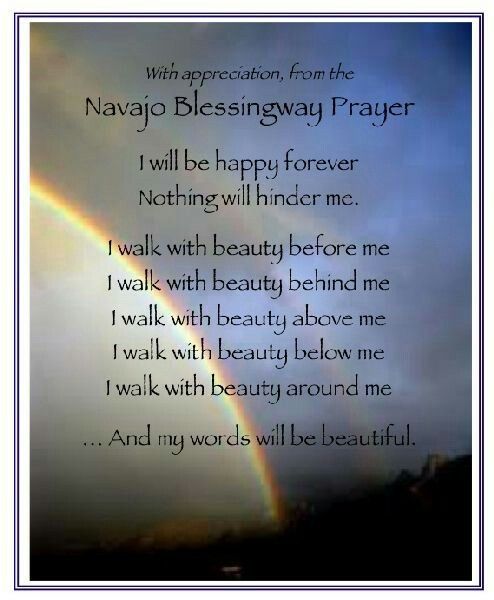
Navaho Blessingway Prayer
|
I first heard the
Navaho Blessingway Prayer
recited by Joseph Campbell on June 26, 1988
on PBS
"The
Power of Myth" with Bill Moyers. It was the 6th and last episode.
Campbell said "The Navaho
have that wonderful image of what they call the pollen path.
And when you realize what pollen is,
it's the life source. And it's a single,
single path, the center, and then they were saying, "Oh, beauty
before me,
beauty behind me, beauty to the right of me, beauty to the left of me,
beauty above me,
beauty below me, I'm on the pollen path." A year later, on
our Medicine Walk at
Mount Shasta
Vision Quest: July 24-30, 1989,
recited this Blessinway Prayer so
I won't get lost in the woods.
Photo Sources: Navaho Costume
(indigenouspeople.net);
Navaho Sand Painting (threadsofspiderwoman.blogspot.com);
Navaho Blessingway Prayer (pinterest.com)
|
If you're lost, don't worry—
stay calm and pray for
sages to bring you home.
.jpg)
Ship of Odysseus
|
.jpg)
Odysseus
|
.jpg)
Paul Brunton
|
.jpg)
Shivapuri Baba
|
The Hindu sage Shivapuri Baba (1826-1963)
lived to be 137 years old. Met J. G. Bennett at Harvard
(1971) who wrote about him & his teaching in
Long Pilgrimage (1965).
On the cover of the book,
he looked 40 years old, but was already 112 years of age.
It's interesting that the bookmark for this
book, shows
"The Grateful Union Bookstore, 1134 Massachusetts Avenue, Cambridge, MA 02138".
Larry Rosenberg recommended me to buy the book before the Bennett lecture.
And now I'm writing
"Notes to Grateful Dead's song Ripple".
Shivapuri Baba walked around the world 25,000 miles
in 40 years (1875-1915), and his teaching will guide you if you're lost.
The British sage Paul Brunton
(1898-1981), whom I met 14 times in Switzerland,
is another good spirit who'll guide your way.
It may be surprising that I've selected
Odysseus as a sage to bring you home.
In Homer's
Odyssey
(8th cenury BC), we see
Odysseus telling his father Laertes:
"I have returned after having been away
for twenty years." (Odyssey, XXIV:319-322).
After 10 years of Trojan War,
shortened by Odysseus
designing a Trojan Horse
for the Greeks to deceive and sack Troy,
his voyage home to Penelope and
Ithaca took another ten years.
Just read David A. Beardsley's
"Homer's Odyssey as Spiritual Quest"
Harvard Center for Hellenic Studies, 2014 (82 pp).
On page 32, he cites Plotinus: Home is the
Fatherland, the inner "true home" of the soul
(Enneads, V.9.1).
That's why no matter how beautiful
Calypso and her island are, they are not home.
Plato concludes his
Republic (375 BC) in Chapter X
with "The Myth of Er" (X.614-X.621).
Er was slain in battle and 12 days later, he revives on his
funeral-pyre and tells others of his journey in the afterlife. During the selections of one's next life,
he saw Orpheus chose the life of a swan, Ajax, that of a lion, Agamemnon, that of an eagle,
some
to be Olympian athletes. Odysseus was the last to choose, and selected the lot
left by all, the life of
an ordinary man. He said, if he had chosen first, it would have been the same
(X.620c). This tale
made me consider Odysseus as a humble sage who will
bring you home to OM, your soul, center
of your heart, the real treasure house. Poem "Home Is Where You Find Happiness" (5-10-1987).
Image Sources: Ship of Odysseus
(fineartamerica.com);
Odysseus Portrait
(john-uebersax.com);
Paul Brunton (wisdomportal.com);
Shivapuri Baba (wisdomportal.com)
|
— Peter Y. Chou
Mountain View, 6-30-2020
| Top
| "Ripple"
| Poems 2020
| Poems 2019
| Poems 2018
| Poems 2017
| Poems 2016
| Poems 2015
| Poems 2014 |
| Poems 2013
| Poems 2012
| Poems 2011
| Haikus 2020
| Haikus 2019
| Haikus 2018
| Haikus 2017
| Haikus 2016 |
| Haikus 2015
| Haikus 2014
| Haikus 2013
| Haikus 2012
| Walks 2019
| News
| CPITS
| Books
| A-Z Portals
| Home |
© Peter Y. Chou,
Wisdom Portal
P.O. Box 390707, Mountain View, CA 94039
email:  (6-30-2020) (6-30-2020)
|
 |
| | | | | | | |

.jpg)







.jpg)


.jpg)
.jpg)



.jpg)

.jpg)



.jpg)
.jpg)
.jpg)
.jpg)
